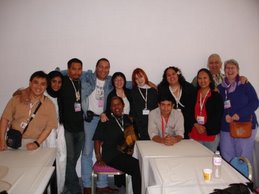On 5 October 2009, the International Telecommunication Union (ITU) opened the 11th Edition of the Telecom World Forum in Geneva. The opening featured remarks by the UN Secretary General Mr. Ban Ki-moon and the ITU Secretary General Mr. Touré.
Telecom World 2009 is a unique event that brings together government officials and leaders from international organisations and the business industry to discuss the role of information communication technology (ICT) in bringing solutions for the global well-being.
At the opening ceremony of Telecom World 2009, Mr. Ban Ki-moon, highlighted the importance of ICT in the work of the United Nations, in particular in the field of peace, human rights, development and climate change. He also called upon governments and the private sector to remember what is at stake and to find “more creative ways to use ICTs to usher in a new green economy” and added, “Let us work together to find new ways to cut waste, reduce emissions, create jobs, protect against disasters and promote better standards of living.”
Mr. Touré not only outlined the importance of ICT in development, but also linked ICTs to human rights. He stressed that “Communication is a basic human right,” and that “if we are to meet the Millennium Development Goals for ICTs then we will need to work in partnership. And we will need to innovate. And we will need to develop new technologies which will help us deliver on our promise to connect the world.”
During the five days of the Telecom World 2009, participants discussed several issues, such as development; ICTs and climate change; and cyber security; as well as technology foresight and access; empowering development through communications; and business models and policy developments.
With regard to cyber security, Mr. Anuj Singh, Director of the Global Response Centre (GRC), an organisation that aims to track and defend against cyber threats, demonstrated an advanced early response system to combat viral attacks. He also called upon ITU Member States to collaborate in order to respond quicker and in a more efficient way to cyber threats. To support this call, Mr. Touré added that “every country is now critically dependent on technology for commerce, finance, healthcare, emergency services, food distribution and more. Loss of vital networks would quickly cripple any nation and none is immune to cyber attack.”
The relationship between climate change and ICT was also taken up. Although ICT industries does contribute to climate change, participants also underlined ICT’s positive role in addressing the problem. At a Roundtable meeting with Heads of State and Government and chief executive officers, Mr. Ban noted “I know the information and communications technology industry itself is part of the problem, causing 2 to 3 per cent of greenhouse gas emissions. But using these tools, your power, you can reduce at least 15 per cent of greenhouse gas emissions from the other sectors.” ICT can also be used to encourage States as well as the private sector to use “environmentally friendly design”; to promote the development of more energy efficient devices; and to have better monitoring mechanisms in place.
Another issue debated at the forum was new mobile technologies that can revolutionize ICT in developing countries. Since the previous Telecom World Forum, held in 2003, the number of subscribers of mobiles phones has increased tremendously with an estimated 4.6 billion subscribers by the end of 2009. However, these subscribers are not equally distributed around the world. There are still regional disparities in the use of mobile technologies and internet connections. Difficult terrain and high costs, among other challenges, pose significant problems for countries wishing to implement simple internet connections. For instance, in Africa, “there is only one fixed broadband subscriber for every 1000 inhabitants, compared to Europe where there are some 200 subscribers per 1000 people.”
The Forum concluded on 9 October 2009. Delegates and participants from 186 countries recognized the contribution of the information communication technology industry to the achievement of the Millennium Development Goals in sectors like education and health. They also agreed on a set of recommendations, including the necessity to find new solutions for fast-moving industries; the promotion of new products and services in the world; and greater inclusion for developing countries in information technology. Moreover, the participants recognized ICT’s key role in combating climate change as it can contribute to the reduction of greenhouse gas emissions in various sectors and to risk reduction in case of natural disasters.
One of the other highlights of the ITU World Telecom 2009 was an exhibition on technologies and advanced applications through 35 thematic pavilions. Each pavilion linked a key issue, such as global health, social exclusion and climate change with new technologies and ICT challenges. The exhibition was built around the theme Open Networks — Connected Minds.”
Coinciding with the Telecom World 2009, was the ITU Youth Forum , for which the two sponsors: ITU and the State of Geneva, had invited 250 university students coming from 135 countries to participate. The students got selected on the basis of submitted essays on “What is the biggest problem facing your community and how would you use ICT to solve it?” During the forum, the students were able to challenge their knowledge by participating in debates and to interact with leaders from the public and private sectors.
For more information on Telecom World 2009, click here.



No comments:
Post a Comment